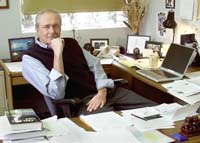Professor an activist and teacher
He is a journalist, educator, activist and has a résumé 10 pages long.
Of everything on the résumé, Edward Pease, journalism department head, said his favorite is making a difference in students’ and others’ lives – “one light bulb at a time.”
Pease has been teaching at Utah State University since 1994. In addition to his department head duties, he also teaches Media Smarts: Making Sense of the Information Age and the journalism Senior Seminar.
Pease said he started his career as a reporter and through the years has written several publications, served on numerous committees and taught many different media classes.
Pease earned his bachelor’s degree in English and journalism at the University of New Hampshire in 1978, his master’s in mass communication at the University of Minnesota in 1981 and his doctorate in journalism and mass communication at Ohio University in 1991.
According to Pease’s USU Web site, www.usu.edu/communic/faculty/pease/tpease.html, some credentials listed on his 10-page résumé include serving on the Pulitzer Prize committee for two years, working as the associate director at the Freedom Forum Media Studies Center at Columbia University in New York and serving as a national officer of the Society of Professional Journalists (SPJ).
Before switching his career to education, Pease worked as a reporter for magazines, newspapers and the Associated Press in Massachusetts, Minnesota and Arkansas.
Shifting from working as reporter to a professor was fairly simple, Pease said, because of a direct link between the two.
“They’re both kind of the same business,” he said. “It’s just a different kind of teaching, and this was not just to the faceless masses. This is a very hands-on way of making a difference.”
One way Pease tries to make a difference is to teach students about inequalities for minorities in the media. Pease’s Media Smarts class studies how different branches of the media represent minorities and the consequences of the representation.
He said most students study journalism because they want to make a difference. Students are passionate about the issues in the world around them, he said.
“I hope that graduates emerge with a sense of engagement in the world,” Pease said. “I hope that they are citizens of the world who are engaged in their communities, countries and with other people.”
Aside from teaching about equal rights in the media, Pease is an activist about the issue.
“Basic civil liberties are a necessary part of the American dream,” Pease said.
He said that being an activist and also a journalist was hard because he needs to be unbiased.
“I’m a little more comfortable in the activist role as a teacher than I was as a journalist,” he said.
By teaching about the misrepresentation of minorities in the media, Pease said he hopes it will help students make a difference.
“In their purest form, journalists are like ministers, social workers, nurses and other people who want to make a difference,” he said. “We believe in the importance of people being informed. A journalist is sort of licensed to mind other people’s business and to ask questions that are none of their business because it’s for a greater good.”
Pease still manages to influence people around the world even though he’s not writing for the general media now. His “today’s word on journalism,” is e-mailed to about 1,700 “misguided souls” around the planet on weekday mornings. What he calls a “free affliction” is “an insightful daily dose of journalism words” which he mentions he only quotes – not necessarily endorses.
Pease’s wife, Brenda Cooper, also works at USU as an associate professor in the journalism department and the director of the USU Women’s Studies program.
The department of journalism and communication had 128 graduates last year. Pease said he is proud of the department, especially the students.
“We do take a parental pride in helping [students] decide what [their] life’s about,” Pease said. “That’s a legacy that important to me and to every teacher.”
-rbarlow@cc.usu.eduWith Emilie Holmes contributing

